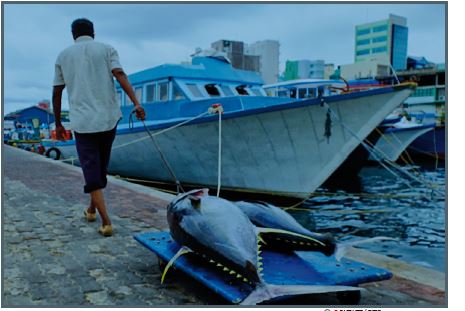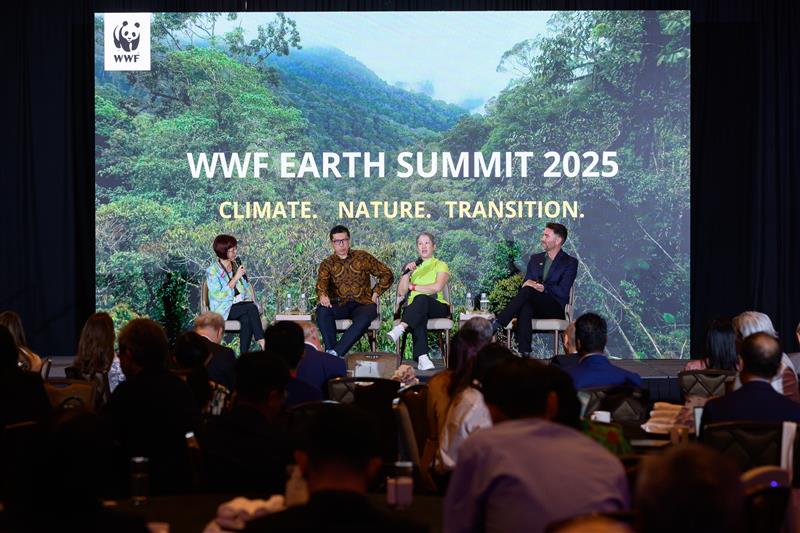Gland, Switzerland. Thirty-eight key businesses, from tuna companies to supermarkets, are joining with WWF to call for better regulation of tuna fishing within the Indian Ocean, in advance of the 20th Indian Ocean Tuna Commission (IOTC) annual meeting this May.
In a collaborative letter, WWF and key national and international businesses1 are calling on the Commission to reduce catches of yellowfin tuna by 20% and introduce harvest control rules to ensure the sustainability of all Indian Ocean tuna stocks, including skipjack.
According to the latest stock assessment conducted by the IOTC, overfishing of yellowfin tuna has been rife in the Indian Ocean since 2013. The Commission, which is responsible for conservation and management of tuna and other marine resources in the Indian Ocean, has also stated that if immediate steps are not taken to end overfishing and rebuild the seriously depleted stock, there is a high risk of stock collapse within just five years.
Despite repeated warnings from the Indian Ocean Tuna Commission’s Scientific Committee, which provides advice to fisheries managers, catches of yellowfin tuna continue to increase, well in excess of recommended limits. And after 20 years of talks, the Commission has yet to adopt any effective measures to control the exploitation of tuna stocks.
“ We are concerned as a country of the recent scientific reports on the status of tuna stocks in the Indian Ocean region, in particular the yellowfin tuna which is currently in the red status”, said Dr. Harrison Charo, the Kenya Director of Fisheries. “It is high time that we IOTC members put in place urgent conservation and management measures to help rebuild the stocks with a view to enhancing the socio-economic benefits to the respective countries and local fishing communities”, said Dr. Charo.
“The industry and communities that rely on a healthy yellowfin stock are rightly concerned by the IOTC’s predictions of a stock collapse in the near future, which would place their livelihoods under threat”, said Dr Wetjens Dimmlich, WWF Indian Ocean tuna program manager. “Measures need to be taken immediately to begin rebuilding the stocks of yellowfin tuna to sustainable levels. With the clear support of such a broad cross section of the tuna fishing community, WWF hopes the IOTC commissioners will respond to this call for action and take steps to protect the industry they are responsible for.”
In 2012, the global tuna catch reached a record high of more than 7m tonnes (FAO, 2014). Skipjack was the biggest contributor to the global tuna market, contributing about 58 per cent to the 2011 catch of principal tunas, followed by yellowfin which contributes around 27 per cent2 . Europe imports more seafood than any other region or country globally, absorbing 24% of the world’s production (EUMOFA, 2014). The EU is the main single export market for Indian Ocean tuna products – 1.2million tonnes3.
Notes to Editors:
1 A copy of the letter signed by fisheries and supermarkets is available here.
2 FAO 2014. The State of World Fisheries and Aquaculture 2014
3 Eurofish Magazine
Full list of corporates: Asda, Bell, Carrefour, Casino, Chancerelle (Connectable), Club Med, Coop (Ch), Coop (UK), Davigel, Delhaize, Direct Seafoods, Fish4Ever, Frinsa, HOFER (ALDI), Iglo, Intermarché, John West, Leclerc, Lovering, Mareblu, Marks and Spencer, Migros, Mercadona, Morrisons, Moshi Moshi, New England Seafood, Palmera, Petit Navire, Picard, Princes, Rio Mare, Sainsburys, Saupiquet, Sodexo, SPAR Austria, Tesco, Thai Union, Waitrose.
For more information please contact:
Wetjens Dimmlich, Indian Ocean Tuna Programme Manager, WWF-Smart Fishing Initiative wdimmlich@wwf.panda.org, Mobile: +248 254 1116
Daniel Suddaby, WWF-Smart Fishing Initiative deputy leader, daniel.suddaby@wwf.panda.org
Aisla Jones, WWF UK, seafood sustainability officer, ajones@wwf.org.uk















